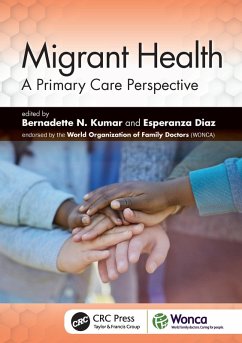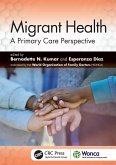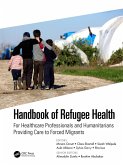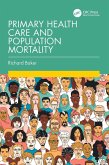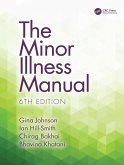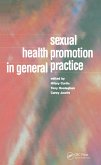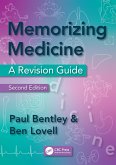Migrant Health (eBook, PDF)
A Primary Care Perspective
Redaktion: Kumar, Bernadette; Diaz, Esperanza
37,95 €
37,95 €
inkl. MwSt.
Sofort per Download lieferbar

19 °P sammeln
37,95 €
Als Download kaufen

37,95 €
inkl. MwSt.
Sofort per Download lieferbar

19 °P sammeln
Jetzt verschenken
Alle Infos zum eBook verschenken
37,95 €
inkl. MwSt.
Sofort per Download lieferbar
Alle Infos zum eBook verschenken

19 °P sammeln
Migrant Health (eBook, PDF)
A Primary Care Perspective
Redaktion: Kumar, Bernadette; Diaz, Esperanza
- Format: PDF
- Merkliste
- Auf die Merkliste
- Bewerten Bewerten
- Teilen
- Produkt teilen
- Produkterinnerung
- Produkterinnerung

Bitte loggen Sie sich zunächst in Ihr Kundenkonto ein oder registrieren Sie sich bei
bücher.de, um das eBook-Abo tolino select nutzen zu können.
Hier können Sie sich einloggen
Hier können Sie sich einloggen
Sie sind bereits eingeloggt. Klicken Sie auf 2. tolino select Abo, um fortzufahren.

Bitte loggen Sie sich zunächst in Ihr Kundenkonto ein oder registrieren Sie sich bei bücher.de, um das eBook-Abo tolino select nutzen zu können.
This practical book is the first to help general practitioners and other primary health care providers improve their provision of care not only to immigrants, but to other vulnerable groups and the whole society.
- Geräte: PC
- mit Kopierschutz
- eBook Hilfe
Andere Kunden interessierten sich auch für
![Migrant Health (eBook, ePUB) Migrant Health (eBook, ePUB)]() Migrant Health (eBook, ePUB)37,95 €
Migrant Health (eBook, ePUB)37,95 €![Handbook of Refugee Health (eBook, PDF) Handbook of Refugee Health (eBook, PDF)]() Handbook of Refugee Health (eBook, PDF)70,95 €
Handbook of Refugee Health (eBook, PDF)70,95 €![Primary Health Care and Population Mortality (eBook, PDF) Primary Health Care and Population Mortality (eBook, PDF)]() Richard BakerPrimary Health Care and Population Mortality (eBook, PDF)36,95 €
Richard BakerPrimary Health Care and Population Mortality (eBook, PDF)36,95 €![The Minor Illness Manual (eBook, PDF) The Minor Illness Manual (eBook, PDF)]() Gina JohnsonThe Minor Illness Manual (eBook, PDF)59,95 €
Gina JohnsonThe Minor Illness Manual (eBook, PDF)59,95 €![Sexual Health Promotion in General Practice (eBook, PDF) Sexual Health Promotion in General Practice (eBook, PDF)]() Hilary CurtisSexual Health Promotion in General Practice (eBook, PDF)43,95 €
Hilary CurtisSexual Health Promotion in General Practice (eBook, PDF)43,95 €![HIV in the UK (eBook, PDF) HIV in the UK (eBook, PDF)]() Jose CatalanHIV in the UK (eBook, PDF)40,95 €
Jose CatalanHIV in the UK (eBook, PDF)40,95 €![Memorizing Medicine (eBook, PDF) Memorizing Medicine (eBook, PDF)]() Paul BentleyMemorizing Medicine (eBook, PDF)38,95 €
Paul BentleyMemorizing Medicine (eBook, PDF)38,95 €-
-
-
This practical book is the first to help general practitioners and other primary health care providers improve their provision of care not only to immigrants, but to other vulnerable groups and the whole society.
Hinweis: Dieser Artikel kann nur an eine deutsche Lieferadresse ausgeliefert werden.
Dieser Download kann aus rechtlichen Gründen nur mit Rechnungsadresse in A, B, BG, CY, CZ, D, DK, EW, E, FIN, F, GR, HR, H, IRL, I, LT, L, LR, M, NL, PL, P, R, S, SLO, SK ausgeliefert werden.
Hinweis: Dieser Artikel kann nur an eine deutsche Lieferadresse ausgeliefert werden.
Produktdetails
- Produktdetails
- Verlag: Taylor & Francis eBooks
- Seitenzahl: 304
- Erscheinungstermin: 10. Juni 2019
- Englisch
- ISBN-13: 9781351017183
- Artikelnr.: 56962767
- Verlag: Taylor & Francis eBooks
- Seitenzahl: 304
- Erscheinungstermin: 10. Juni 2019
- Englisch
- ISBN-13: 9781351017183
- Artikelnr.: 56962767
- Herstellerkennzeichnung Die Herstellerinformationen sind derzeit nicht verfügbar.
Bernadette N. Kumar leads the Migration Health work package of the EU Joint Action on Health Inequalities and is the current President of the EUPHA section of Migration and Ethnic Minority Health. She was appointed Director of NAKMI (Norwegian Center for Migration and Minority Health, now part of the Norwegian Institute of Public Health) in 2010 and Associate Professor, Global Health at the Institute for Health and Society, University of Oslo in 2013. She has also been a commissioner of the Lancet Commission on Migration and Health. Esperanza Diaz is a Specialist in Primary Care. She works as Associate Professor in the Department of Global Public Health and Primary Care, University of Bergen, and is a Senior Researcher at the Unit for Migration and Health, Norwegian Institute of Public Health, Norway.
Section I: Overarching Themes. 1. Migration and migrants: What we know
about worldwide mobility and why it matters. 2. Migration health theories:
Healthy migrant effect and allostatic load. Can both be true? 3. Culture,
language and the clinic - Three stories, two keys. 4. The ethics of migrant
health: Power and privilege versus rights and entitlements. 5.
Discrimination and health. 6. Migrants' use of primary health care
services: Overuse, underuse, or both? Section II: A Life-Course
Perspective. 7. A life-course perspective on migrant health. 8. Promoting
the health of migrant children and children of migrants. 9. Adolescent
migrant health. 10. Health care for older and elderly migrants. 11. Family
and group as a unit of care. Section III: Health Challenges at the Clinic.
12. Health challenges at the clinic. 13. Gynaecology and obstetrics. 14.
Chronic disease prevention and management: An understated priority. 15.
Understanding unexplained and complex symptoms and diseases. 16. Cancer
among migrant patients. 17. Migration and mental health. 18.
Multimorbidity: The complexity. Section IV: Opportunities and Tools. 19.
Opportunities and tools when meeting migrant patients. 20. Bridging
cultural and language discordance. 21. Evidence-based guidelines and
advocacy. 22. Diversity-sensitive versus adapted services for migrants: The
example of dementia care in Germany. 23. Assessment tools for dementia and
depression in older migrants. 24. Community participation in primary health
care: Meaningful involvement of migrants.
about worldwide mobility and why it matters. 2. Migration health theories:
Healthy migrant effect and allostatic load. Can both be true? 3. Culture,
language and the clinic - Three stories, two keys. 4. The ethics of migrant
health: Power and privilege versus rights and entitlements. 5.
Discrimination and health. 6. Migrants' use of primary health care
services: Overuse, underuse, or both? Section II: A Life-Course
Perspective. 7. A life-course perspective on migrant health. 8. Promoting
the health of migrant children and children of migrants. 9. Adolescent
migrant health. 10. Health care for older and elderly migrants. 11. Family
and group as a unit of care. Section III: Health Challenges at the Clinic.
12. Health challenges at the clinic. 13. Gynaecology and obstetrics. 14.
Chronic disease prevention and management: An understated priority. 15.
Understanding unexplained and complex symptoms and diseases. 16. Cancer
among migrant patients. 17. Migration and mental health. 18.
Multimorbidity: The complexity. Section IV: Opportunities and Tools. 19.
Opportunities and tools when meeting migrant patients. 20. Bridging
cultural and language discordance. 21. Evidence-based guidelines and
advocacy. 22. Diversity-sensitive versus adapted services for migrants: The
example of dementia care in Germany. 23. Assessment tools for dementia and
depression in older migrants. 24. Community participation in primary health
care: Meaningful involvement of migrants.
Section I: Overarching Themes. 1. Migration and migrants: What we know
about worldwide mobility and why it matters. 2. Migration health theories:
Healthy migrant effect and allostatic load. Can both be true? 3. Culture,
language and the clinic - Three stories, two keys. 4. The ethics of migrant
health: Power and privilege versus rights and entitlements. 5.
Discrimination and health. 6. Migrants' use of primary health care
services: Overuse, underuse, or both? Section II: A Life-Course
Perspective. 7. A life-course perspective on migrant health. 8. Promoting
the health of migrant children and children of migrants. 9. Adolescent
migrant health. 10. Health care for older and elderly migrants. 11. Family
and group as a unit of care. Section III: Health Challenges at the Clinic.
12. Health challenges at the clinic. 13. Gynaecology and obstetrics. 14.
Chronic disease prevention and management: An understated priority. 15.
Understanding unexplained and complex symptoms and diseases. 16. Cancer
among migrant patients. 17. Migration and mental health. 18.
Multimorbidity: The complexity. Section IV: Opportunities and Tools. 19.
Opportunities and tools when meeting migrant patients. 20. Bridging
cultural and language discordance. 21. Evidence-based guidelines and
advocacy. 22. Diversity-sensitive versus adapted services for migrants: The
example of dementia care in Germany. 23. Assessment tools for dementia and
depression in older migrants. 24. Community participation in primary health
care: Meaningful involvement of migrants.
about worldwide mobility and why it matters. 2. Migration health theories:
Healthy migrant effect and allostatic load. Can both be true? 3. Culture,
language and the clinic - Three stories, two keys. 4. The ethics of migrant
health: Power and privilege versus rights and entitlements. 5.
Discrimination and health. 6. Migrants' use of primary health care
services: Overuse, underuse, or both? Section II: A Life-Course
Perspective. 7. A life-course perspective on migrant health. 8. Promoting
the health of migrant children and children of migrants. 9. Adolescent
migrant health. 10. Health care for older and elderly migrants. 11. Family
and group as a unit of care. Section III: Health Challenges at the Clinic.
12. Health challenges at the clinic. 13. Gynaecology and obstetrics. 14.
Chronic disease prevention and management: An understated priority. 15.
Understanding unexplained and complex symptoms and diseases. 16. Cancer
among migrant patients. 17. Migration and mental health. 18.
Multimorbidity: The complexity. Section IV: Opportunities and Tools. 19.
Opportunities and tools when meeting migrant patients. 20. Bridging
cultural and language discordance. 21. Evidence-based guidelines and
advocacy. 22. Diversity-sensitive versus adapted services for migrants: The
example of dementia care in Germany. 23. Assessment tools for dementia and
depression in older migrants. 24. Community participation in primary health
care: Meaningful involvement of migrants.
